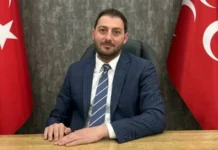İsmail Ülker, a 42-year-old former police chief who has been imprisoned for 23 months over alleged links to the Gülen movement as part of the Turkish government’s massive post-coup witch hunt, passed away on Sunday because of belated cancer treatment.
According to a report by online news outlet TR724, Ülker had neither been released from prison nor been allowed to receive treatment for a long time despite a report provided by a board of doctors about his deteriorating health and urgent need for treatment. Ülker was just allowed by Turkish authorities to receive treatment last month; however, it was too late and he died at the hospital on Sunday, making Ülker’s children orphans on Fathers’ Day.
Ülker was arrested and sent to prison in July 2016. He had fallen ill in prison and was diagnosed with colon cancer. Despite of his serious condition he was not released from prison and treatment was also blocked by the authorities. After a number of applications he was finally allowed to receive treatment a month ago.
The Stockholm Center for Freedom (SCF) reported in one of its studies titled “Suspicious Deaths and Suicides In Turkey” that there has been an increase in the number of suspicious deaths in Turkey, most in jails and detention centers, where torture and ill-treatment are being practiced. In the majority of cases, authorities concluded they were suicides without any effective, independent investigation.
Suspicious deaths have also taken place beyond prison walls amid psychological pressure and threats of imminent imprisonment and torture, sometimes following the release of suspects or just before their detention. SCF has compiled 114 cases of suspicious deaths and suicides in Turkey in a list in a searchable database format.
Turkey survived a controversial military coup attempt on July 15, 2016 that killed 249 people. Immediately after the putsch, the Justice and Development Party (AKP) government along with President Recep Tayyip Erdoğan pinned the blame on the Gülen movement.
Fethullah Gülen, who inspired the movement, strongly denied having any role in the failed coup and called for an international investigation into it, but President Erdoğan — calling the coup attempt “a gift from God” — and the government initiated a widespread purge aimed at cleansing sympathizers of the movement from within state institutions, dehumanizing its popular figures and putting them in custody.
Turkey has suspended or dismissed more than 150,000 judges, teachers, police and civil servants since July 15. On December 13, 2017 the Justice Ministry announced that 169,013 people have been the subject of legal proceedings on coup charges since the failed coup.
Turkish Interior Minister Süleyman Soylu announced on April 18, 2018 that the Turkish government had jailed 77,081 people between July 15, 2016 and April 11, 2018 over alleged links to the Gülen movement.















